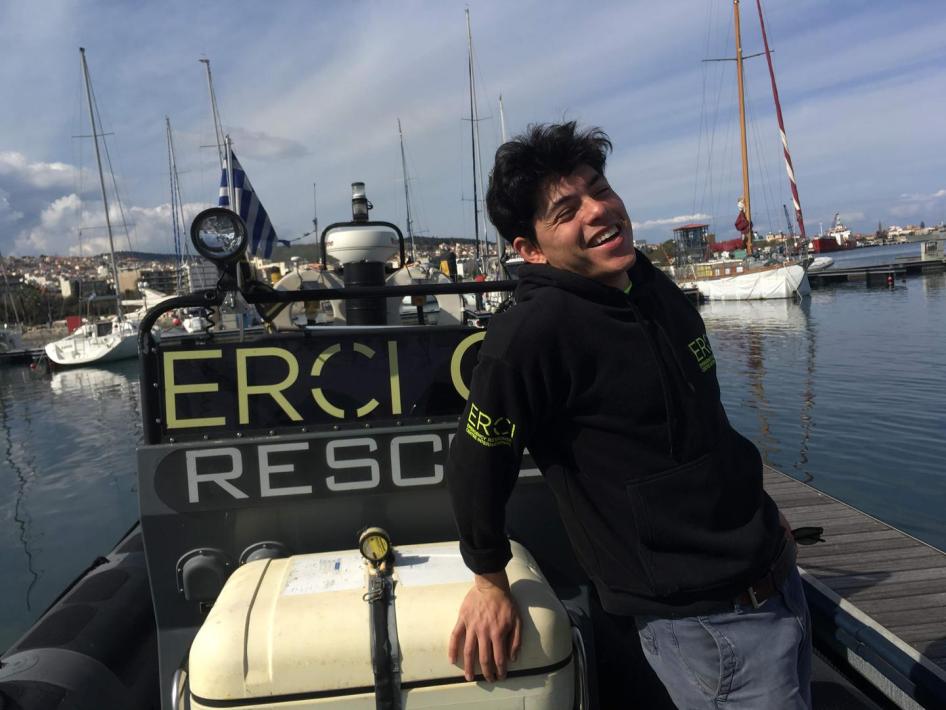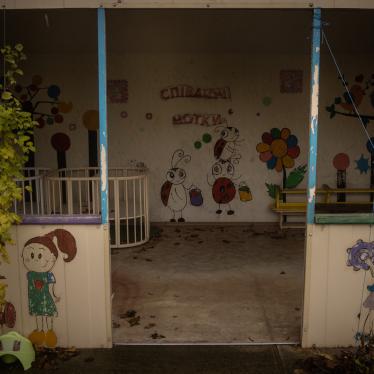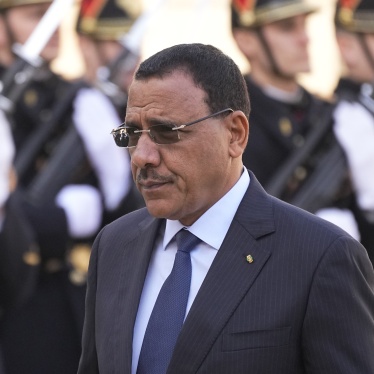(Athens) The criminal accusations brought by Greek prosecutors against activists for their efforts to rescue migrants and asylum seekers at sea appear entirely unfounded, Human Rights Watch said today. Human Rights Watch analyzed court records and other documents in the cases of two of the four activists currently in pretrial detention.
The two foreign volunteers Sarah Mardini, 23, and Sean Binder, 24, have been detained for more than two months. Two Greek nationals are also in pretrial detention, including Nassos Karakitsos, 37, who was arrested a week after Mardini and Binder. Their detention followed a police investigation and a prosecutor’s accusations that misrepresent humanitarian search and rescue operations as people smuggling by an organized crime ring. Greek judicial authorities should drop the baseless accusations and release them from pretrial detention.
“Accusations of money laundering, people smuggling, and espionage appear no more than an effort to criminalize humanitarian activism on behalf of refugees and migrants in Greece,” said Bill Van Esveld, senior children’s rights researcher at Human Rights Watch. “These charges should be dropped, and the activists should be freed.”
Mardini, a Syrian refugee, and Binder, a German national and the son of a Vietnamese refugee, began volunteering in search and rescue operations on the island of Lesbos in 2017 with a nonprofit organization, Emergency Response Center International (ERCI). Greek police arrested Mardini on August 21, 2018, in the airport on Lesbos as she was about to fly to Germany to begin her second year of undergraduate studies at Bard College Berlin. Upon hearing of Mardini’s arrest, Binder went to visit her in police custody on Lesbos, where he was also arrested.
Karakitsos, an employee of ERCI, was arrested on August 28. Another employee, Mirella Alexou, and Panos Moraitis, who founded the group in 2015, subsequently turned themselves in to the police. Alexou was released on bail on November 2. Human Rights Watch was unable to obtain detailed information about the accusations against them. Mardini is detained in Athens, while Binder, Karakitsos, and Moraitis are detained on the island of Chios. ERCI, a registered nonprofit organization in Greece that also provided primary medical care and non-formal education programs for refugee and migrant children has ceased operations.
Mardini had traveled by boat from Turkey to Greece in 2015. The engine broke down, and she and her younger sister, who went on to participate in the Olympics in 2016, helped save others on board by swimming and pulling the boat to Lesbos.
Human Rights Watch examined the police reports, accusations, and other court documents in the case against Mardini and Binder, and spoke to their lawyers, other humanitarian volunteers, former classmates, and university administrators who know them.
The felony accusations claim that Mardini and Binder’s efforts to conduct search and rescue operations in the Aegean Sea and to help people who arrived on the island of Lesbos amount to people smuggling, even though the law they allegedly violated (Law 4251 of 2014) excludes helping asylum seekers. The accusations also misrepresent their volunteer work with a registered humanitarian nonprofit group that regularly coordinated with and participated in joint operations with the Greek Coast Guard as membership in a criminal organization; their monitoring of open maritime radio channels and public websites for information about refugee and migrant boats in distress as violations of government secrets and espionage; and their fundraising for a humanitarian group as money laundering, Human Rights Watch said.
The five felonies of which Mardini and Binder are accused carry penalties of up to 25 years in prison. Greek law allows for up to 18 months of pretrial detention. A judge rejected their appeals for release on September 10 due to the gravity of the accusations, and because he concluded they might “re-offend” and were ineligible for house arrest because they do not have permanent addresses in Greece.
After arresting Mardini, Binder, and Karakitsos, Greek police issued a statement on August 28 alleging they were among 6 Greeks and 24 foreigners from several organizations who are complicit in crimes related to “organized migrant trafficking rings” with knowledge of “specific refugee flows,” without identifying them.
“That the Greek police used the term ‘trafficking’ to describe humanitarian rescue shows the absurdity of the accusations,” Van Esveld said. “The police statement concedes that the people being rescued are ‘refugees’ who should not be penalized for entering illegally to seek asylum. Yet it claims that helping them is ‘trafficking,’ which by definition involves coercion and exploitation, for which there is no evidence whatsoever.”
Based on information available to Human Rights Watch, several others mentioned in the police file have been summoned for questioning. As of November 2, Greek authorities had questioned and unconditionally released at least three other people whom police had accused in the case, in addition to releasing Alexou on €1,000 (about US$1,300) bail.
Greek prosecutors have previously sought criminal penalties against volunteers helping migrants and asylum seekers. In May, a Greek court on Lesbos acquitted five foreign volunteers from two organizations of aiding illegal immigration. Greek authorities had arrested the volunteers in January 2016, while they were helping boats carrying migrants and refugees.
Putting rescuers in jail could have a chilling effect on other humanitarian activists at a time when the number of people drowning in waters between Turkey and Greece is increasing, Human Rights Watch said. Since the beginning of 2018, more than 150 have died or been reported missing in the Aegean Sea, compared with 62 in all of 2017 for roughly the same number of arrivals.
The overall death rate in the Mediterranean, including the central and western sectors between North Africa and Europe, has also risen dramatically while nongovernmental rescue groups face bureaucratic and legal obstacles to continuing their life-saving operations, the International Organization for Migration said.
“The case against rescue volunteers in Greece is part of a distressing pattern of attacks across the European Union on humanitarian efforts to help migrants and refugees,” Van Esveld said. “Solidarity with people fleeing persecution, war, and serious human rights violations should be encouraged and celebrated, not criminalized.”
Unfounded Accusations against Mardini and Binder
The police began investigating Mardini and Binder in February, after arresting them on February 9 while they had parked an ERCI four-wheel drive car and were looking out to sea for refugee boats, at a location they regularly used. Greek authorities were aware of the location and routinely checked on the volunteers, a former ERCI volunteer told Human Rights Watch, in order to ensure they were registered according to the rules of the Ministry of Migration Policy. Police said the car had fake military license plates concealed beneath its lawful civilian license plates, and detained Mardini and Binder for 48 hours. Police then obtained warrants to access their mobile phones and computers.
On July 26, the police finalized an 86-page report detailing allegations against them and others using information obtained from their smartphones, primarily text conversations from WhatsApp groups created to coordinate between humanitarian actors. The analysis below is based on the police report and other court documents. While police have stated that 30 people are suspected of a variety of alleged crimes, this analysis addresses the accusations against Mardini and Binder.
People Smuggling
The prosecutor accuses Mardini and Binder of being smugglers who facilitated the illegal transportation of people to Greece in violation of Greek Law 4251 of 2014. However, ERCI presented all the people rescued at sea or helped on shore to Greek authorities so they could access identification and processing procedures, a former ERCI volunteer who is not part of the case and a lawyer representing Mardini and Binder told Human Rights Watch. Article 2 of Law 4251 excludes people helping asylum seekers, persons seeking international protection in accordance with international law, from being penalized.
Mardini and Binder allegedly failed to inform the Coast Guard of the locations of boats coming irregularly from Turkey, which the police report says prevented the authorities from “activating deterrence procedures” against asylum seekers and migrants on the boats.
The defendants’ court submissions state that ERCI did regularly notify the Coast Guard of the location of the boats. In September, the deputy head of the Greek Coast Guard in Mytilini testified in the case that ERCI members regularly called him to notify him about incoming boats. While nonprofit groups conducting search and rescue operations in Greek waters should, as a matter of best practice, seek to coordinate with competent authorities as far as possible, there is no obligation in Greek law or the international law of the sea requiring rescuers to notify national or other authorities before proceeding with urgent rescues at sea.
The accusation specifies 11 instances when Mardini and Binder allegedly facilitated smuggling, with knowledge of the boats’ routes and timing, the number of people aboard, and their intended destinations in Greece. Binder was not physically present in Greece on at least 6 of those occasions, 5 of which occurred before he arrived on Lesbos in October 2017. Previously, he was in the UK, completing his master’s degree in international relations at the London School of Economics, according to his lawyer and to two former classmates who spoke with Human Rights Watch. On a sixth specified date in December 2017, he was attending his graduation in London, said the classmates, who also attended.
Mardini was attending classes, taking examinations, or meeting the dean at Bard College Berlin; lecturing on the refugee crisis at the US consulate in Budapest; or attending a conference at Harvard University on six of the dates on which she is accused of helping people to illegally enter Greece, based on information Bard College Berlin provided to Human Rights Watch.
Espionage
In court documents, Mardini and Binder acknowledge that they and other members of ERCI drove along regular routes on the island of Lesbos, scanning the sea for boats in distress, and monitored open radio frequencies used by the Greek coast guard and Frontex, the EU external border agency, to learn about boats at risk. These are essential and routine tasks carried out by volunteer rescuers. ERCI sent its own small boats to conduct rescues in Greek waters and helped migrants and asylum seekers after they arrived on the islands, and according to former ERCI volunteers, consistently notified and coordinated with the Greek coast guard.
The volunteers are accused of espionage under article 148 of the penal code for monitoring the radio channels and the positions of Coast Guard and Frontex vessels. However, as the police report acknowledges, the radio channels – 12, 19, and 37 – are not encrypted and can be accessed by anyone with a VHF radio. The Coast Guard used these radio channels to communicate and coordinate rescues with ERCI. The positions of Coast Guard and Frontex vessels are published in real time on commercial ship-tracking websites.
Separately, under Law 4070 of 2012, Mardini and Binder are accused of using radio devices without a license. In court documents, they state that the radios were purchased before they began volunteering and that they were not aware of the licensing requirement.
Mardini and Binder are accused of communicating with refugee boats to help them evade Greek and Frontex vessels and of sharing information that interests of state require be kept secret from foreign governments under article 146 of the penal code, which provides for up to 10 years in prison. The police report, which is the basis of the prosecution, contains no evidence concerning the accusation.
The prosecutor alleges that the volunteers fraudulently used military license plates to enter restricted-access military areas on Lesbos where refugees and migrants sometimes disembarked. It is unclear how the volunteers could have pretended that they were driving a military vehicle, because witnesses said, and photographs confirmed, the car prominently displayed “ERCI” logos. The police report on which the accusations are based does not include any evidence that Mardini and Binder tried to enter restricted military areas in the vehicle.
Money Laundering
The accusation claims that because ERCI allegedly carried out human smuggling, Mardini and Binder’s volunteer work amounts to membership in a criminal organization under article 187 of the Greek penal code. The prosecution further accused Mardini of money laundering under Law 3691 of 2008, for her efforts to raise funds on ERCI’s behalf. The police report claims: “she exploited the fact that she is originally from Syria [and] that she has been characterized as a refugee.”
Mardini’s response to the accusation states that, as a volunteer, she had no access to ERCI’s funds or knowledge of its finances, and that the group simply covered volunteers’ living costs on Lesbos. Police also searched Mardini and Binder’s bank account records, but the only evidence contained in the police report and the accusation are Facebook messages in which Mardini states, “I am a long-time volunteer and I help with fundraising.”








